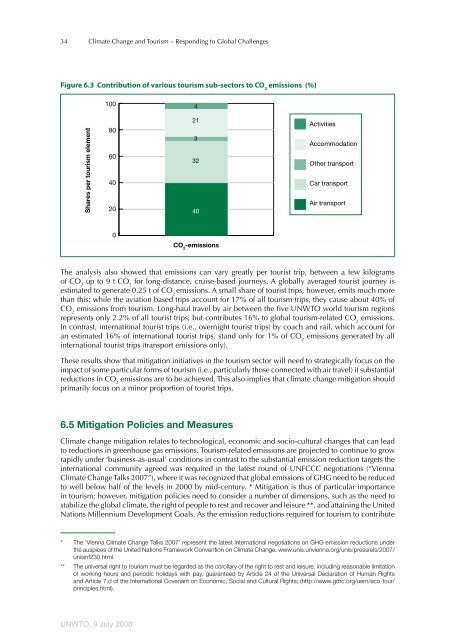Climate Change and Tourism - UNEP - Division of Technology ...
Climate Change and Tourism - UNEP - Division of Technology ...
Climate Change and Tourism - UNEP - Division of Technology ...
You also want an ePaper? Increase the reach of your titles
YUMPU automatically turns print PDFs into web optimized ePapers that Google loves.
34 <strong>Climate</strong> <strong>Change</strong> <strong>and</strong> <strong>Tourism</strong> – Responding to Global Challenges<br />
Figure 6.3 Contribution <strong>of</strong> various tourism sub-sectors to CO 2 emissions (%)<br />
Shares per tourism element<br />
100<br />
80<br />
60<br />
40<br />
20<br />
UNWTO, 9 July 2008<br />
0<br />
CO 2 -emissions<br />
Activities<br />
Accommodation<br />
Other transport<br />
Car transport<br />
Air transport<br />
The analysis also showed that emissions can vary greatly per tourist trip, between a few kilograms<br />
<strong>of</strong> CO 2 up to 9 t CO 2 for long-distance, cruise-based journeys. A globally averaged tourist journey is<br />
estimated to generate 0.25 t <strong>of</strong> CO 2 emissions. A small share <strong>of</strong> tourist trips, however, emits much more<br />
than this: while the aviation based trips account for 17% <strong>of</strong> all tourism trips, they cause about 40% <strong>of</strong><br />
CO 2 emissions from tourism. Long-haul travel by air between the five UNWTO world tourism regions<br />
represents only 2.2% <strong>of</strong> all tourist trips, but contributes 16% to global tourism-related CO 2 emissions.<br />
In contrast, international tourist trips (i.e., overnight tourist trips) by coach <strong>and</strong> rail, which account for<br />
an estimated 16% <strong>of</strong> international tourist trips, st<strong>and</strong> only for 1% <strong>of</strong> CO 2 emissions generated by all<br />
international tourist trips (transport emissions only).<br />
These results show that mitigation initiatives in the tourism sector will need to strategically focus on the<br />
impact <strong>of</strong> some particular forms <strong>of</strong> tourism (i.e., particularly those connected with air travel) if substantial<br />
reductions in CO 2 emissions are to be achieved. This also implies that climate change mitigation should<br />
primarily focus on a minor proportion <strong>of</strong> tourist trips.<br />
6.5 Mitigation Policies <strong>and</strong> Measures<br />
4<br />
21<br />
3<br />
32<br />
40<br />
<strong>Climate</strong> change mitigation relates to technological, economic <strong>and</strong> socio-cultural changes that can lead<br />
to reductions in greenhouse gas emissions. <strong>Tourism</strong>-related emissions are projected to continue to grow<br />
rapidly under ‘business-as-usual’ conditions in contrast to the substantial emission reduction targets the<br />
international community agreed was required in the latest round <strong>of</strong> UNFCCC negotiations (“Vienna<br />
<strong>Climate</strong> <strong>Change</strong> Talks 2007”), where it was recognized that global emissions <strong>of</strong> GHG need to be reduced<br />
to well below half <strong>of</strong> the levels in 2000 by mid-century. * Mitigation is thus <strong>of</strong> particular importance<br />
in tourism; however, mitigation policies need to consider a number <strong>of</strong> dimensions, such as the need to<br />
stabilize the global climate, the right <strong>of</strong> people to rest <strong>and</strong> recover <strong>and</strong> leisure **, <strong>and</strong> attaining the United<br />
Nations Millennium Development Goals. As the emission reductions required for tourism to contribute<br />
* The ‘Vienna <strong>Climate</strong> <strong>Change</strong> Talks 2007’ represent the latest international negotiations on GHG emission reductions under<br />
the auspices <strong>of</strong> the United Nations Framework Convention on <strong>Climate</strong> <strong>Change</strong>. www.unis.unvienna.org/unis/pressrels/2007/<br />
unisinf230.html.<br />
** The universal right to tourism must be regarded as the corollary <strong>of</strong> the right to rest <strong>and</strong> leisure, including reasonable limitation<br />
<strong>of</strong> working hours <strong>and</strong> periodic holidays with pay, guaranteed by Article 24 <strong>of</strong> the Universal Declaration <strong>of</strong> Human Rights<br />
<strong>and</strong> Article 7.d <strong>of</strong> the International Covenant on Economic, Social <strong>and</strong> Cultural Rights; (http://www.gdrc.org/uem/eco-tour/<br />
principles.html).

















